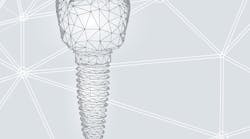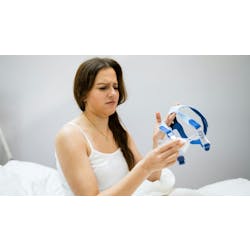According to the American Academy of Implant Dentistry, 3 million people have dental implants.1 The number of dental implants placed is projected to rise 500,000 a year over the next five years.1 Studies conducted by Dr. Jan Derks demonstrate that 14.5 percent of patients have developed peri-implantitis with pronounced bone loss, and 7.6 percent lost at least one implant.2 Implant failure is related to several different factors. When an implant abutment fails, it is often due to the lack of proper bone formation or excessive load on the implant.3 Other factors are systemic disease, autoimmune disorders, chronic health conditions, cigarette smoking, bruxism, lack of proper plaque removal, and, most commonly, excess cement.2 The body recognizes additional cement as a foreign body, which increases the adhesion of bacteria and increase of local inflammation around the implants. Dental cement has been shown to lower the survival of osteoblast; therefore, removal of excess cement is crucial.
As dental hygienists, it is important that we educate our patients on the negative effects of bruxism, proper home care, effective removal of biofilm, calculus, and cement to reduce peri-implantitis. Utilizing the proper chairside technologies will enable our patients to reduce their risk of implant failure.
Toss the plastic
Not every instrument is safe to use on instruments. In fact, plastic instruments can compromise the implant by leaving plastic particles on the implant. Studies conducted by Mann et al., found, “Metal scalers produce defects in titanium implant surfaces and load and power are important factors in the damage caused. Plastic-coated scaler probes cause minimal damage to implant surfaces but can leave plastic deposits behind on the implant surface.”2
Debriding with a titanium scaler on a titanium implant has been shown to avoid compromising the implant and remove destructive debris.3,4 Medical-grade titanium instruments, which prevent any scratching or residue on the implant, with a resin handle can be found through Paradise Dental Technologies (PDT).
Backed by clinical studies demonstrating effectiveness and safety, Susan Wingrove, RDH, created the Wingrove Titanium Implant to properly remove debris from “narrow-based bulbous crowns, wide-based crowns, locater abutments, Hader bars, exposed threads and cement removal.”5 Hu-Friedy offers a titanium, teal-colored anodized titanium to assist with proper acuity.6 American Eagle offers medical-grade titanium that is surrounded by a lightweight handle to prevent hand fatigue while removing implant-compromising debris.7
pH matters
Clinical studies demonstrate that a titanium implant is more likely to be affected by corrosion in a low pH environment.8 Educating patients to reduce the amount, frequency, and duration in which they consume foods and drinks that are acidic in nature will not only help to reduce the risk of tooth decay, but will also help reduce the risk of compromising the patient’s implant investment. Understanding the ingredients of a product, as well as the efficacy of the product, is the responsibility of the dental provider. Therefore, home-care products that are recommended to our patients should be of neutral pH.
CloSYS mouth rinse balances the pH of the mouth, and is free of dyes, gluten, sulfates, triclosan, and alcohol. The active ingredient, stabilized chlorine dioxide, “exhibited strong bactericidal activity with killing of most test organisms within a matter of minutes.”8 Studies conducted by Dr. Robert Wirthlin demonstrate that CloSYS surpassed the kill rate of chlorhexidine within the first minute when destroying A. naeslundii and P. micros (both involved in periodontal disease).9 CloSYS also had the same kill rate as chlorhexidine after five minutes for Strep. mutans and A. viscosus.9 The ability to extinguish bacteria that can compromise the tissue and bone surrounding the implant, without increased stain and taste, allows the most sensitive patients to achieve a healthier mouth.
It is important that we educate our patients on the negative effects of bruxism, proper home care, effective removal of biofilm, calculus, and cement to reduce peri-implantitis. Utilizing the proper chairside technologies will enable our patients to reduce their risk of implant failure.
Replace the prophy cup
Biofilm, calculus, and residual cement compromise the longevity of the implant.10,11 Glycine-based powder can be used subgingivally with a titanium-tipped prophy jet to remove destructive debris. The very fine “perio” powder is typically in a neutral flavor.
Studies conducted by Flemmig et al, investigated the efficacy and safety on subgingival air polishing with glycine powder. The 30 patients who participated in the were diagnosed with chronic periodontitis, which included pocket depths of 4-9 MM.12
Subgingival glycine powder was administered in deep pockets followed by SRP, and patients were monitored at day 10 and 90 days post-treatment. The results demonstrated the subgingival total P. gingivalis counts in the oral cavity were significantly reduced after full-mouth GPAP. The study compared to SRP at day 90, where the “total P. gingivalis counts in the oral cavity were significantly reduced after full-mouth GPAP compared to SRP at day 90.”12 Therefore, the results demonstrate more effective removal of subgingival biofilm, when compared to SRP alone, in patients with moderate to severe periodontal disease.12
Acteon offers a titanium-tipped a prophy jet called the Air-N-Go. Equipped with two modes, “Supra function for supra-gingival polishing: daily prophylactic polishing. Perio function for subgingival polishing: maintenance, periodontal and peri-implant treatments.”13 The tip was designed with implants in mind, as it is safe and effective to use against the titanium implant. The natural glycine-based powder features low abrasiveness that removes biofilm while preserving the treated surfaces.
Hu-Friedy offers the Air-Flow Handy that also attaches to the slow speed of the unit. A plastic subgingival tip is placed on the end to allow the powder to go subgingival with the Perio Powder.13 The Air-Flow Perio Powder is made from glycine, is 25 microns, and is ideal for the removal of subgingival biofilm. The Air-Flow Classic Powder is 40 microns to allow for increased comfort in supragingival stain removal.13
Additionally, Dentsply Sirona also offers Tap-On Technology to improve foot ergonomics and a prophy mode that alternates between air polish and rinse.14 The automated purge function allows the clinician to perform other tasks while the system flushes itself. All tips and handles are autoclavable.
Water flossers for the win
Clinical studies comparing traditional floss with a water-based flosser demonstrate a significant decrease in bleeding for those utilizing a water flosser.15 Effectively removing biofilm around implants with a powerbrush and interproximal aids will help to prevent peri-implantitis. Studies conducted by Magnuson et al., compared decrease in bleeding of two groups of patients, comparing the reduction of BOP when using traditional floss and a water flosser.15 The results demonstrated a 81% reduction of BOP in water flosser users compared to 33.3% reduction of BOP in the floss group.
When it comes to complying with the recommendation for a specialist consult, patients often require multiple reminders to receive the initial consult. Often, the urgency to have extensive treatment with a new provider is what inhibits the patient from being compliant with the consult. MouthWatch allows the provider to capture still intraoral images, create a video tour of the patients’ condition, share radiographs, and expediting the initial consult with the patient.16 The specialist has the ability to review all data needed and begin to generate a comprehensive treatment plan. This mode of consultation allows the patient to have an overview of the treatment needed and allows the first visit to the office to be much more productive.
Equipping our patients with the proper tools and education to achieve proper oral health is essential to disease prevention. Increasing our own chairside knowledge of the proper way to maintain implants, as well as contraindications of product recommendations will allow our patients to have greater success in implant longevity. Patients invest a significant amount of time and money for an implant that a dental provider has recommended. As dental hygienists, we play an important role in providing preventive education to protect this investment. Let’s empower our patients to have gingival health and longevity of the implants they invest in!
References
1. American Academy of Implant Dentistry. Dental Implants, Facts and Figures. 2017. Available at: https://www.aaid.com/about/Press_Room/Dental_Implants_FAQ.html. Accessed October 18, 2017.
2. Dorr L. New study finds troubling rates of dental implant complications. The study evaluated rates of dental implant loss and peri-implantitis as the result of dental implants. November 10, 2015. Available at: http://www.dentalproductsreport.com/dental/article/new-study-finds-troubling-rates-dental-implant-complicationsAccessed February 26, 2018.
3. https://www.ncbi.nlm.nih.gov/pmc/articles/PMC5423581/
4. Mann M, Parmar D, Walmsey AD, et al. Effect of plastic-covered ultrasonic scalers on titanium implant surfaces. Clin Oral Implants Res. 2012 Jan;23(1):76-82. doi: 10.1111/j.1600-0501.2011.02186.x. Epub 2011 Apr 13. Accessed October 18, 2017.
5. Paradise Dental Technologies.Titatnioum Instruments. Available at: https://www.pdtdental.com/wingrove-implant-maintenance. 2018. Accessed March 1, 2018.
6. Hu Friedy. Titanium Implant Scalers. 2017. Available at: https://www.hu-friedy.com/TIS. Accessed March 1, 2018.
7. American Eagle Insturments. Implant Instruments. Available at: http://www.am-eagle.com/products/implant-instruments. Accessed March 1, 2018.
8. Mohsen NF, Awadallah MA, Hanafy SA. Effects of pH changes on the corrosion resistance of anodizing titanium dental implant with cobalt chromium bar attachment. Int J Sci Res. 2016;5(8):57-63. doiI: 10.21275/ART2016776. https://www.ijsr.net/archive/v5i8/ART2016776.pdf.
9. Villhauer A, Drake D. Novel CloSYS Oral Rinse: Comparison of Bactericidal Activity. Available at: https://www.researchgate.net/profile/Alissa_Villhauer/publication/266805178_Novel_ClosysII_Oral_Rinse_Comparison_of_Bactericidal_Activity/links/5845a25b08ae61f75dd7c95f/Novel-ClosysII-Oral-Rinse-Comparison-of-Bactericidal-Activity.pd. Accessed March 1, 2018.
10. Slot DE, Louropoulou A, Van der Weijden F. (2014), Peri-implant therapy for the dental hygienist Susan S. Wingrove. 2013, Wiley-Blackwell. 196 pages, soft cover. ISBN 978-0-470-96285-5. . Int J Dent Hygiene, 12: 235–236. doi:10.1111/idh.12088.
11. Greenstein G, Cavallaro J. The clinical significance of keratinized gingiva around dental implants. Journal of Periodontology. Compend Contin Edu Dent. 2011; 32:24-31.
12. Flemmig, et al. Randomized Controlled Trial Assessing Efficacy and Safety of Glycine Powder Air Polishing in Moderate-to-Deep Periodontal Pockets. oi: 10.1902/jop.2011.110367.
13. Hu-Friedy. Air flow Therapy. 2018. Available at: http://www.hu-friedy.com/BIOFILM#Products. Accessed March 8, 2018.
14. Dentsply. Cavitron Air Polishing Prophy Jet. 2018. Available at: http://www.dentsply.com.au/cavitron-air-polishing-prophy-jet-8195002x. Accessed March 8, 2018.
15. Magnuson B, Harsono M, Stark PC, Lyle D, Kugel G, Perry R. Comparison of the effect of two interdental cleaning devices around implants on the reduction of bleeding: A 30-day randomized clinical trial. Compend Contin Educ Dent. 2013;34(Spec. No. 8):2-7.
16. Mouthwatch. 2016. Available at: https://www.mymouthwatch.com. Accessed March 8, 2018.
Amber Auger, RDH, MPH, is a hygienist with experience in multiple clinical settings, including facilities abroad. She obtained a master’s degree in public health from the University of New England and a bachelor’s in dental hygiene from the University of New Haven. She holds a part-time position at an elite dental office in Boston. She is a key opinion leader for several dental companies, a speaker, and a published author, and she can be contacted at amberaugerrdh.com.






